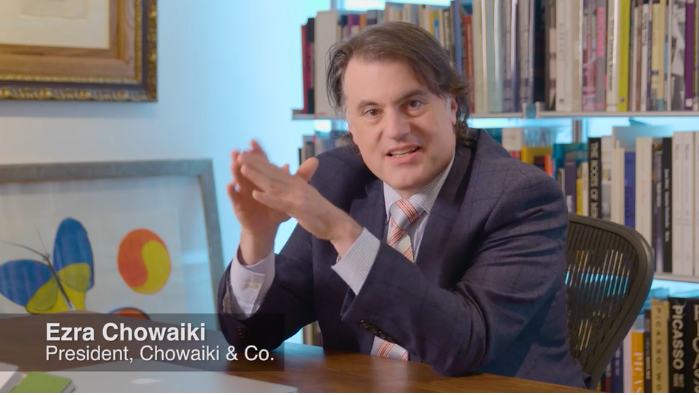
A New York art dealer is facing federal charges for allegedly defrauding elite clients out of millions of dollars. The US attorney has accused the dealer, Ezra Chowaiki, of wire fraud and the transport of stolen goods.
According to court papers, the scheme began in 2015 and entangled a number of well-known art-world figures, including the dealer Helly Nahmad and collector and Warhol muse “Baby Jane” Holzer.
The indictment, which was first reported by Bloomberg, alleges that Chowaiki sold his victims a stake in works of art that he did not own and sometimes sold shares that totaled more than 100 percent of the work’s value.
The federal charges, filed on December 15, come on the heels of five civil suits against the dealer. In recent weeks, Sotheby’s auction house, a private collector, an antiques dealer, a New York-based business, and an art advisor have all filed complaints against Chowaiki in New York Supreme Court. Sotheby’s is seeking to recover $3 million it says it is owed by the dealer.
The 49-year-old Chowaiki surrendered to federal authorities on Friday and was released on a $100,000 bond.
A Former Ice Cream Salesman
Chowaiki founded his gallery in 2004, according to the US attorney’s complaint, and specialized in Modern masters such as Pablo Picasso, Alexander Calder, and Marc Chagall. According to a 2009 lawsuit by a former gallery employee, Chowaiki was an “unsuccessful screenwriter” and former ice cream salesman with “no formal education or expertise in art.”
The art market often relies on handshake deals even for high-dollar amounts—but these allegedly fraudulent transactions did not, says New York attorney Judd Grossman, who represents several of the plaintiffs.
“Part of what allowed him to perpetuate this massive fraud is that these transactions were being papered in a formal way, not just with one-line invoices, like you often see with such deals,” Grossman tells artnet News. “There were contracts and supporting documentation. It wasn’t for lack of due diligence that these people got duped.”
Chowaiki & Co., New York at Spring Masters 2016. Photo: Henri Neuendorf.
The criminal complaint alleges that Chowaiki’s victims wired him as much as $1.2 million for partial shares in a work—only to be told later that the dealer did not actually own the work in question.
Another client who bought a Marc Chagall painting from Chowaiki later learned that the dealer had already offered it to art lending service Borro as collateral for a loan. (Borro declined to comment.)
“While Ezra Chowaiki appeared to buy and sell high-end artwork in his upscale Manhattan gallery,” acting US attorney Joon H. Kim said in a statement, “he sold clients nothing more than an illusion.”
The victims reside in locales as far-flung as New York and Tokyo and the indictment alleges that the fraud continued as recently as November, when Chowaiki filed for bankruptcy.
A Mounting Number of Claims
The lawsuits lift a curtain on the opaque art business and the colorful cast of characters within it.
In one of the civil suits, collector Naftali Leser names not only Chowaiki but also David Dangoor, who owns two-thirds of Chowaiki Gallery (Chowaiki himself owns one-third), as well as New York dealer Ely Sakhai. Leser says the gallery never returned a Giorgio de Chirico painting, Ettore e Andromaca (ca. 1960–1965), that he consigned in 2015.
(The dealer Sakhai, also named in the suit, pleaded guilty in 2004 to fraud charges as part of another scheme to sell convincing copies of Modern artworks. He was sentenced to more than three years in prison.)
Grossman, Leser’s attorney, says that Chowaiki Gallery declared bankruptcy only hours after his client filed suit on November 13. He claims that Dangoor allowed Chowaiki to continue to perpetrate his fraud even after an in-house “whistle-blower” alerted him to the problem.
Meanwhile, Sotheby’s claims that Chowaiki did not hold up his end of the bargain in a deal to share in the profits from the sale of Henri Matisse’s painting Titine Trovato in Dress and Hat.
According to the agreement laid out in legal papers, the gallery agreed in 2008 to buy the painting on behalf of Sotheby’s for $12 million, after which the house planned to offer it for private sale with an asking price of $20 million. If Sotheby’s was unable to sell the work privately, it would offer it at auction. Should the painting sell for less than $12 million, Chowaiki would cover the net loss.
The canvas did indeed fail to sell at auction in November 2008; the house ultimately found a buyer at a loss of $4.75 million in May 2012. To date, however, Sotheby’s says that Chowaiki has paid only $2.1 million and still owes just under $3 million. The auction house declined to comment on the case or its arrangement with Chowaiki.
Court papers show that the gallery had assets of only about $277,000 and liabilities of nearly $11.9 million when it closed last month. According to the papers, the gallery’s creditors include Di Donna Galleries, Helly Nahmad, “Baby Jane” Holzer, and the gallery’s co-owner David Dangoor himself.
Neither of Chowaiki’s lawyers immediately responded to a request for comment. After the dealer appeared in court on Friday, his attorney Daniel Parker told reporters that Chowaiki “has an impeccable reputation in the art world and looks forward to restoring it.”
The government has 30 days from Chowaiki’s arrest on December 15 to indict him.